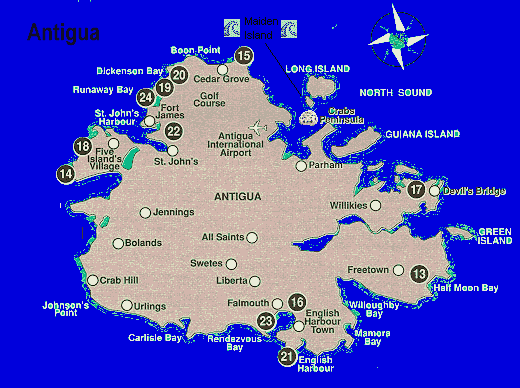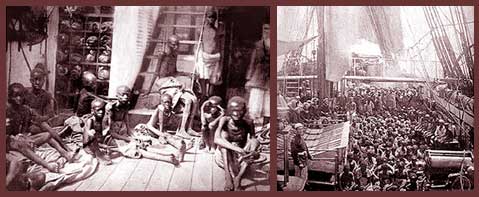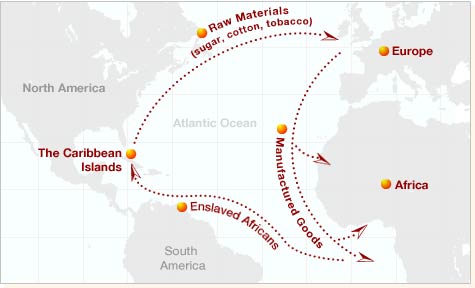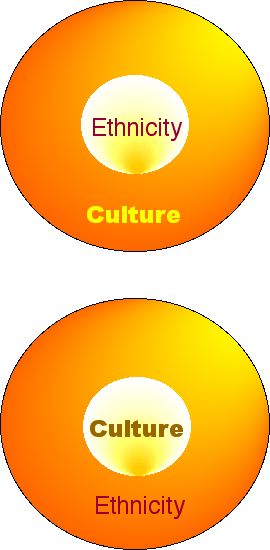
A Small Place.
"they are referring to the nine by twelve mile long, drought ridden island of Antigua."
p. 51.
108 square miles discovered by Columbus in 1493, is described by a native Caribbean woman. Her name is Jamaica Kincaid and she wrote for many years for the New Yorker magazine.
Jamaica Kincaid:
For example Ms. Kincaid Questions
slavery | Imperialism | tourism | culture
| Evidence | |
|---|---|
 |
What is a legacy? What is culture? pp. 49-50 What is Liberty? pp. 48-49 |
Photography of slave ship, late 1870s |
|
"In Antigua, people speak of slavery as if it had been a pageant full of large ships sailing on blue water, the large ships filled with human cargo --their ancestors; they got off were forced to work under conditions that were cruel and inhuman, they were beaten, they were murdered, they were sold, their children were taken from them and these separations lasted forever. There were many other bad things, and then suddenly the whole thing came to an end in something called emancipation."
pp. 54-55
Size matters:
"In a small place people cultivate small events."
p. 52.
Time does not exist as "past, present and future."
p. 54
"There
is an appropriate obsession with slavery."
p. 43
critique of slavery
pp. 54-55
"the Barclay brothers , who started Barclays Bank, were slave traders. That is how they made their money. When the English outlawed the slave trade, the Barclay brothers went into banking."
Pp. 25-26
"Do you ever try to understand why people like me cannot get over the past, cannot forgive, and cannot forget?
p. 25.
Self reflective and self effacing,
pp. 57-58
"I look at this place (Antigua) and I look at these people (Antiguans), and I cannot tell whether I was brought up by, and so come from, children, eternal innocents or artists who have not yet found eminence in a world too stupid to understand, or lunatics who have made their own lunatic asylum, or an exquisite combination of all three."
Electricity
critique of the public - private relationship of support structures for telephone, electric utilities and cable television franchise.
p. 59.
"Gambling, linked here to tourism, is another popular industry in the West Indies."
Pp. 60-61.
Antigua is beautiful. Antigua
is too beautiful. Sometimes the beauty of it seems  unreal.
...
unreal.
...
Nothing, then, natural or unnatural, to leave a mark on their character."
Pp. 77-80.
So too with the slaves, once they are free, they are no longer noble and exalted; they are just human beings."
p. 81.
Selected excerpts:
Of Antigua:
"It was discovered by Columbus in 1493. Not long after, it was settled by human rubbish from Europe, who used enslaved but noble and exalted human beings from Africa to satisfy their desire for wealth and power, to feel better about their own miserable existence, so that they could be less lonely and empty-- a European disease. Eventually the masters left a kind of way; eventually the slaves were freed, in a kind of way....Antigua now, the people who really think of themselves as Antiguans, are the descendants of those noble and exalted people, the slaves."
Pp. 80-81.
Of the English imperial efforts she says:
"They don't seem to know that this empire business was all wrong....for no natural disaster could equal the harm they did."
Pp. 23-24
"The thing you have always suspected about yourself the minute you become a tourist is true: A tourist is an ugly human being. You are not an ugly person all the time; you are not an ugly person day to day."
p. 14.
"An ugly thing, that is what you are when you become a tourist, an ugly, empty thing, a stupid thing, a piece of rubbish pausing There and There to gaze at this and taste that, and it will never occur to you that the people who inhabit the place in which you have just paused cannot stand you, that behind their closed doors they laugh at your strangeness,... They do not like you. They do not like me!
p. 17.
But the banality of your own life is very real to you;
Oh, the hard work all of this is, and is it any wonder, then, that on your return home you feel the need of a long rest, so that you can recover from your life as a tourist?"
p. 18
Caribbean Island forests
Tourists may never see the deforestation that undermines island economy and culture, not to mention wildlife and water bcause to have water any place needs forests to capture and hold the rainfall in the soil. Wildlife are nourished by the excess fo rainfalll soaking into the earth. Theis excess of rainfall over the water that percolates into the ground is called runoff. Water is used on all islands but the sources of that hydeological resource may be far from where the tourists reside.
A. emancipation
B. manumission
It is easy to confuse the terms emancipation with manumission. The term manumission was a legal condition that could be attained by any slave whose master allowed the slave to earn the means for the enslaved person to buy their freedom. Manumitted slaves formed the large mulattoe class of people, called Maroons on Jamaica, in the Caribbean and Brazil and coastal areas of South and Central America. Thomas Jefferson believed in the eventual manumission of slaves in Virginia and authored a law to that effect.
But emancipation, on the other hand, means to release from a lifetime of servitude by edict, law, or force and thus to give liberty to all enslaved persons, regardless of their capacity to pay for or earn their freedom. The French Revolution's Declaration of the Rights of Man essentially called for the freeing of slaves in the French nation and its imperial posessions. Thus the ideals of the French Revolution promoted emancipation.
What is culture?
"For have you ever heard of any culture springing up under the umbrella of a Minister of Culture?
In countries that have no culture or are afraid they may have no culture, There is a Minister of Culture."
"And what is culture anyway? In some places, its the way they play drums; in other places, its the way you behave out in public; and in still other places, its just the way a person cooks food. And so what is There to preserve about these things? For is it not that people make them up as they go along, am them up as they need them?
pp. 49-50

Cultural landscapes are the product of one form of human settlement crowding out older patterns of land and water uses.
Whereas the original places where certain forms of agricultural organization emerge from to spread worldwide are called cultural hearths, because these places give rise to crops and tamed animals.
Caribbean means? | Labyrinth of Solitude | Mintz: Sweetness and Power | Crosby on imperialism
Implications for Mexico and the Caribbean